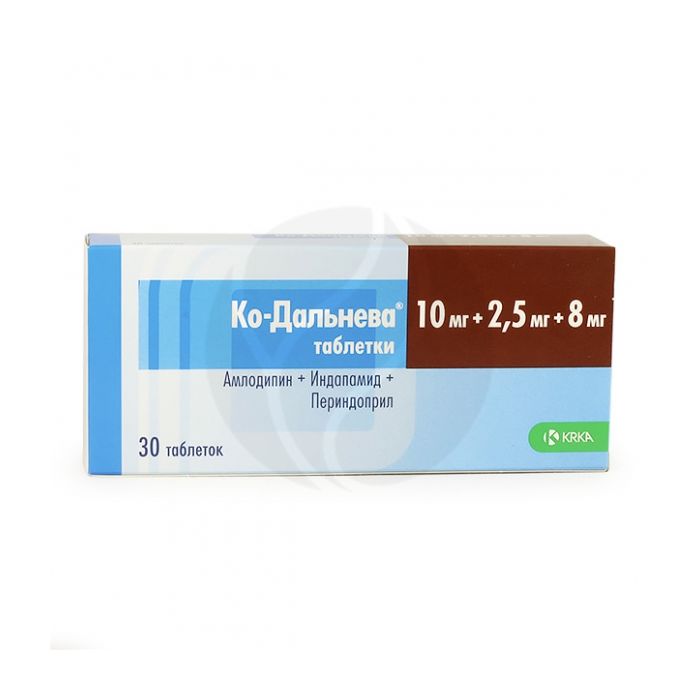Ko-dalneva tablets 10 + 2.5 + 8mg, No. 30
Expiration Date: 05/2027
Russian Pharmacy name:
Ко-дальнева таблетки 10+2,5+8мг, №30
Arterial hypertension (if necessary, simultaneous therapy with amlodipine, indapamide and perindopril in doses used in monotherapy of individual components).
Inside, 1 tab. 1 time per day, preferably in the morning, before meals.
The dose of Ko-DalnevaЃ is selected after a previously titrated dose of the active components of the drug. The maximum daily dose of Ko-DalnevaЃ is 8 mg perindopril + 2.5 mg indapamide + 10 mg amlodipine.
Elderly patients and patients with impaired renal function. Ko-DalnevaЃ is contraindicated for use in patients with moderate and severe renal impairment (Cl creatinine less than 60 ml / min). The drug Ko-Dalneva can be used in patients with creatinine Cl equal to or exceeding 60 ml / min. Individual selection of doses of amlodipine, indapamide, perindopril is recommended for such patients. Amlodipine, used in equivalent doses, is equally well tolerated by both elderly and younger patients. It is not required to change the dosage regimen in elderly patients, however, increasing the dose should be carried out with caution, which is associated with age-related changes and prolongation of T1 / 2.
The change in the concentration of amlodipine in blood plasma does not correlate with the severity of renal failure.
Patients with impaired liver function. Ko-DalnevaЃ is contraindicated in patients with severe hepatic impairment.
Caution should be exercised when using the drug in patients with mild to moderate liver dysfunction.
| Pills | 1 tab. |
| the composition of the tablets is indicated in the table |
| Indicators | Dosages of Ko-DalnevaЃ tablets (amlodipine + indapamide + perindopril), mg | |||
| 5 + 0.625 +2 | 5 + 1.25 +4 | 5 + 2.5 +8 | 10 + 2.5 +8 | |
| Active substances: | ||||
| Amlodipine besylate, * mg | 6,935 | 6,935 | 6,935 | 13.87 |
| (corresponds to amlodipine, mg) | five | five | five | ten |
| Indapamide | 0.625 | 1.25 | 2.5 | 2.5 |
| Perindopril erbumin B (substance-granules), mg | 10.206 | 20,412 | 40,824 | 40,824 |
| (corresponds to perindopril erbumin), mg | 2 | four | 8 | 8 |
| Excipients of the substance-granules: | ||||
| MCC, mg | 7.9 | 15.8 | 31.6 | 31.6 |
| Calcium chloride hexahydrate, mg | 0.6 | 1,2 | 2.4 | 2.4 |
| Excipients: | ||||
| MCC, mg | 90,244 | 79,413 | 165,761 | 158,826 |
| Pregelatinized starch, mg | 21 | 21 | 42 | 42 |
| Sodium carboxymethyl starch, mg | 8.4 | 8.4 | 16.8 | 16.8 |
| Sodium bicarbonate, mg | 0.76 | 0.76 | 1.52 | 1.52 |
| Colloidal silicon dioxide, mg | 0.43 | 0.43 | 0.86 | 0.86 |
| Magnesium stearate, mg | 1.4 | 1.4 | 2.8 | 2.8 |
* 3 here and hereinafter, the name of the salt 'Amlodipine besylate' corresponds to the name 'Amlodipine besylate'. |
hypersensitivity to amlodipine and other dihydropyridine derivatives, indapamide and other sulfonamide derivatives, perindopril and other ACE inhibitors, as well as excipients that make up the drug;
a history of angioedema (Quincke's edema) associated with the use of ACE inhibitors;
hereditary / idiopathic angioedema;
bilateral stenosis of the renal arteries, stenosis of the artery of a single kidney;
severe arterial hypotension (SBP less than 90 mm Hg);
shock (including cardiogenic);
unstable angina (with the exception of Prinzmetal's angina);
obstruction of the left ventricular outflow tract (eg, clinically significant aortic stenosis);
hemodynamically unstable heart failure after acute myocardial infarction;
renal failure (Cl creatinine less than 60 ml / min);
severe liver failure, incl. hepatic encephalopathy;
refractory hypokalemia;
simultaneous use with drugs that can cause polymorphic ventricular arrhythmias of the 'pirouette' type (see 'Interaction');
simultaneous use with potassium-sparing diuretics, potassium and lithium preparations, in patients with an increased content of potassium in the blood plasma;
simultaneous use of drugs that prolong the QT interval;
simultaneous use with aliskiren and aliskiren-containing drugs in patients with diabetes mellitus;
patients on hemodialysis, as well as patients with untreated heart failure in the stage of decompensation (there is no sufficient clinical experience);
pregnancy (see 'Application during pregnancy and lactation');
the period of breastfeeding (see 'Application during pregnancy and breastfeeding');
age up to 18 years (efficacy and safety have not been established).

